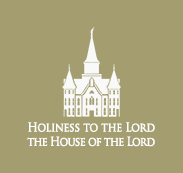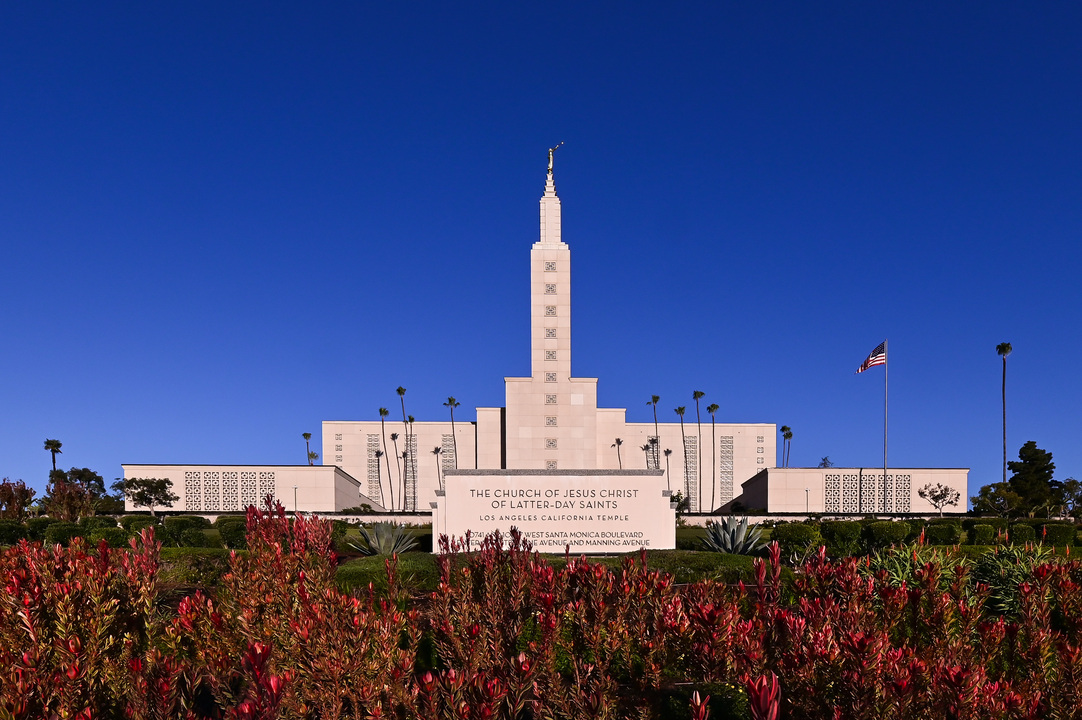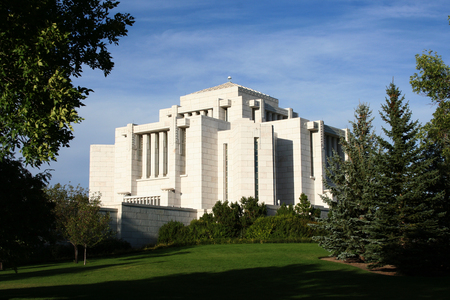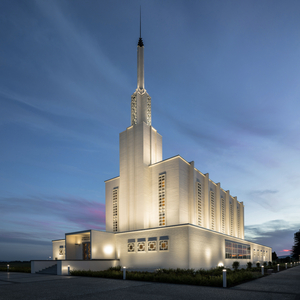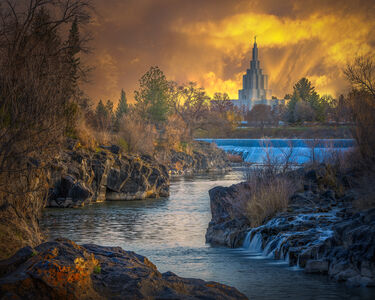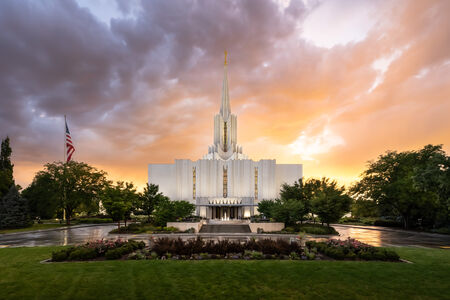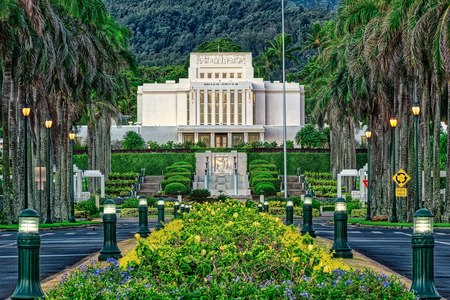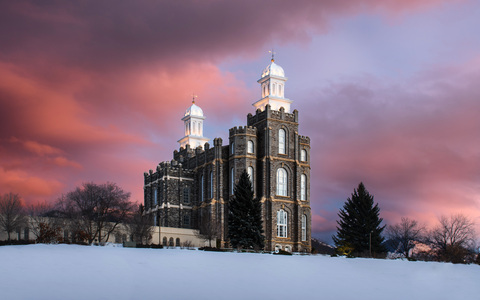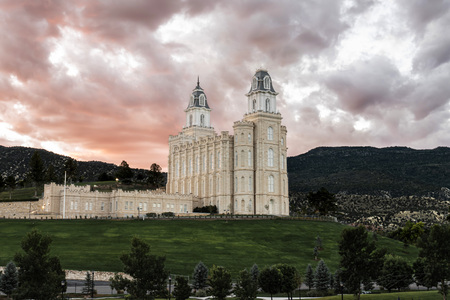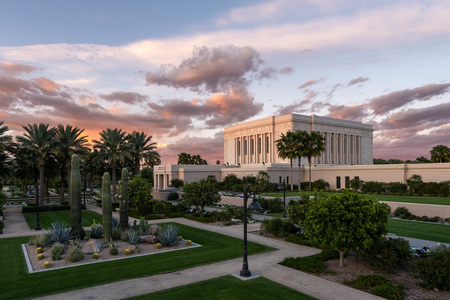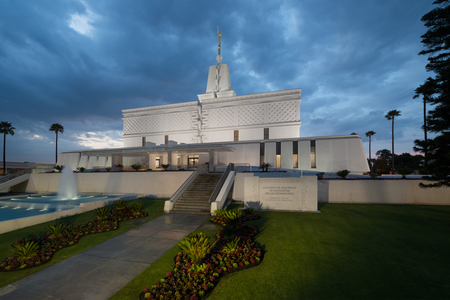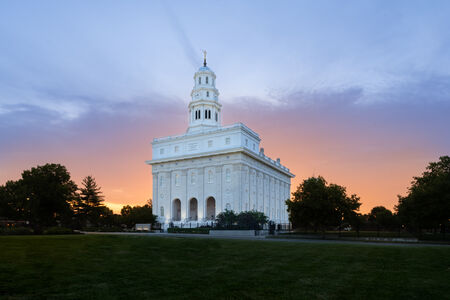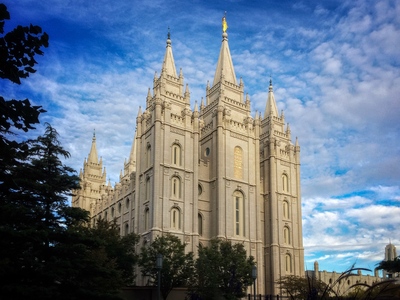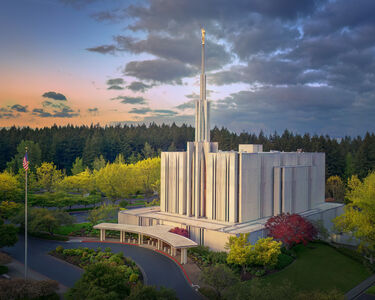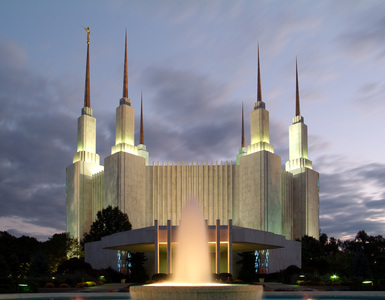Address
10777 Santa Monica BlvdLos Angeles, California 90025-4718
United States
Telephone: (+1) 310-474-5569
Services
Visitors' center open to the publicNO arrival center available
Patron housing available
Distribution center on site (Store Locator)
Announcement:
6 March 1937Groundbreaking and Site Dedication:
22 September 1951 by David O. McKayPublic Open House:
19 December 1955–18 February 1956Dedication:
11–14 March 1956 by David O. McKaySite:
13 acres | 5.3 hectaresExterior Finish:
Covered with 146,000 square feet of Mo-Sai stone facing, a mixture of crushed quartz and white Portland cement quarried in Utah and Nevada. The wainscot around the exterior is Rockville granite from MinnesotaArchitectural Features:
Single attached end spire with an angel Moroni statueOrdinance Rooms:
Four instruction rooms (four-stage progressive), ten sealing rooms, and one baptistryTotal Floor Area:
190,614 square feet | 17,709 square metersHeight:
257 feet | 78.3 metersElevation:
289 feet | 88 metersTemple Locale
The 257-foot high Los Angeles California Temple looms over famous Santa Monica Boulevard in Westwood. The spacious grounds are filled with a dazzling array of foliage including—to name a few—Canary Island Pine trees, several varieties of palm trees, Bird of Paradise trees, olive trees, and rare Chinese Ginkgo trees. Two fountains, a large reflection pool, and several family-themed statues further beautify the grounds. North of the temple is a public visitors' center that showcases a representation of Thorvaldsen's Christus statue and also houses the popular Los Angeles Family History Library. The temple grounds are all aglow at Christmastime when thousands of multi-colored lights decorate the numerous trees and features.
Temple Facts
The Los Angeles California Temple was the first temple built in California.
The Los Angeles California Temple was the first temple to include a priesthood assembly room and angel Moroni statue following the Salt Lake Temple. The spacious assembly room seats about 2,000 and features three pulpits on each end.
At the time of its construction, the Los Angeles California Temple was the largest temple of the Church. (The Salt Lake Temple later reclaimed the title with its additions and annexations.)
The presentation of the endowment was originally delivered by live acting in the Los Angeles California Temple. It was the last temple designed for live acting.
The Los Angeles California Temple features beautiful hand-painted murals on the walls of its progressive-style ordinance rooms: Creation Room, Garden Room, World Room, Terrestrial Room (no murals), and Celestial Room. (Only two other temples feature full Celestial Room murals: the Idaho Falls Idaho Temple and the Hamilton New Zealand Temple. The corner pillars in the Logan Utah Temple Celestial Room portray a heavenly landscape, too.)
The Los Angeles California Temple is one of only seven temples where patrons progress through four ordinance rooms before passing into the Celestial Room. (The other six temples are the Manti Utah Temple, the Laie Hawaii Temple, the Cardston Alberta Temple, the Mesa Arizona Temple, the Idaho Falls Idaho Temple, and the Nauvoo Illinois Temple.)
The land for the Los Angeles California Temple was purchased from Harold Lloyd Motion Picture Company on March 23, 1937.
World War II delayed construction of the Los Angeles California Temple for many years. During that time, plans for the temple were revised to include a priesthood assembly room and to accommodate a unprecedented 300 patrons per session.
The 15½-foot statue of the angel Moroni, sculpted by Millard F. Malin, was placed atop the Los Angeles California Temple in October 1954. During one of his frequent visits to the temple, President David O. McKay noticed that the angel faced southeast as did the temple. He informed architect Edward O. Anderson "that it was not correct in that position…that the angel must face east." The angel had generated much conversation among the neighbors, and one indicated, perhaps tongue in cheek, that she "certainly never would be interested [in learning more about the Church] until the angel faced her home." One morning she awoke to find the statue "was looking directly at her place." Brother Anderson had followed President McKay's instructions to turn the angel.1
The Los Angeles California Temple is one of only five temples featuring an angel Moroni statue holding the gold plates, but it is the only one of the five not sculpted by Avard Fairbanks. (The other four temples are the Washington D.C. Temple, the Jordan River Utah Temple, the Seattle Washington Temple, and the Mexico City Mexico Temple.)
The two-month public open house for the Los Angeles California Temple attracted 682,361 visitors, who toured the magnificent structure.
In his opening remarks at the dedication of the Los Angeles California Temple, President David O. McKay stated: "This is one of the most memorable dedicatory services, if not, in many respects, the most memorable temple dedicatory service ever held in the Church. All the general authorities are present, or will be, in one or more of these sessions. Only one is absent this morning, because of the illness of his wife. This is probably the largest congregation ever assembled at a dedicatory service."
The Los Angeles California Temple was briefly captured in a scene from the 1966 Batman movie, which was filmed in Westwood.
The Los Angeles California Temple closed for 10 weeks in its 25th anniversary year, 1981, for remodeling and refurbishment. The addition of two rooms and audio visual equipment allowed sessions to begin every half hour in a stationary motion-picture presentation of the endowment.
In 2003, the Los Angeles California Temple was reverted to a progressive-style presentation of the endowment (still using film). The Terrestrial Room was completely renovated.
In November 2005, the Los Angeles California Temple closed for a seismic overhaul and renovation of the baptistry, reopening July 11, 2006—the same year as the 50th anniversary of the dedication of the temple.
- Richard O. Cowan, Temples to Dot the Earth (Springville, Utah: Cedar Fort, Incorporated, 1997) 183.
